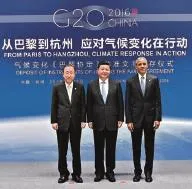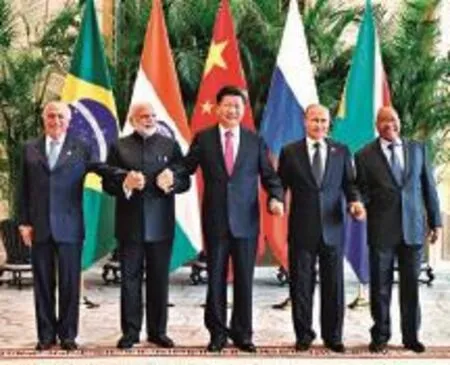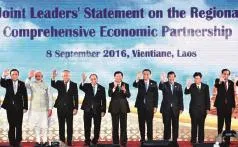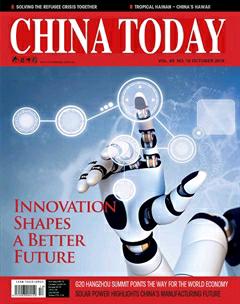Exchanges
Exchanges
Deposit of Instruments of Joining the Paris Agreement

Chinese President Xi Jinping,U.S.President Barack Obama and UN Secretary-General Ban Ki-moon jointly attended a ceremony marking the Deposit of Instruments of Joining the Paris Agreement in Hangzhou on September 3, 2016.
Xi Jinping pointed out that it was a new and solemn commitment of the Chinese government to submit such an instrument to the UN. The fact that China and the U.S. jointly deposited their legal instruments of joining the Paris Agreement shows their ambition and determination in jointly fighting against global environmental issues, Xi said. Taking the implementation of the Paris Agreement as an opportunity, the international community should redouble its efforts to constantly enhance and improve the global governance system,and find new ways to combat climate change so as to promote an early resolution and comprehensive implementation of the Paris Agreement.
Barack Obama said that it was of historic significance that the U.S. and China,the two largest economies and largest CO2emitters, ratified and accepted the Paris Agreement at the same time. The U.S. is willing to maintain close cooperation with China and strive to build a safer and more prosperous world, he added.
Ban Ki-moon said that China and the U.S., by taking the lead in ratifying the Paris Agreement, will greatly boost the chances of its taking effect within this year. The UN speaks highly of the leadership role of the two countries in tackling climate change.
The Paris Agreement was adopted on December 12, 2015 at the Climate Change Conference in Paris. China and the U.S. both signed the Paris Agreement on April 22, 2016.
Xi Jinping Attends BRICS Leaders’ Informal Meeting

Chinese President Xi Jinping, Prime Minister Narendra Modi of India, President Jacob Zuma of South Africa, President Michel Temer of Brazil and President Vladimir Putin of Russia attended the BRICS Leaders’ Informal Meeting, held in Hangzhou on September 4, 2016.
Xi put forward four proposals for enhancing BRICS cooperation. First, there should be joint innovation of growth patterns. Second, member states should jointly improve global governance. Third, they should jointly safeguard international fairness and justice and build a peaceful and stable development environment. Fourth, they should jointly advance international cooperation in development while following a path of sustainable development. Xi said he believed that BRICS countries would undoubtedly achieve greater development as long as they uphold the BRICS’ spirit of openness, inclusiveness, cooperation and winwin results and continuously strengthen their partnerships despite hardships, distractions, and difficulties.
Attending leaders agreed that to maintain the impetus of economic growth, BRICS countries should continue to serve as an important engine for global economic growth. Guided by the principles of openness, unity, equality, mutual understanding, inclusiveness and mutually beneficial cooperation, BRICS countries should further strengthen their strategic partnerships and promote the establishment of an equal and fair international order on the basis of international law.
Third China-Japan High-level Political Dialogue Held in Beijing
China’s State Councilor Yang Jiechi co-chaired the 3rd China-Japan High-level Political Dialogue with the Secretary General of the National Security Secretariat - Shotaro Yachi of Japan - in Beijing on August 25,2016.
Yang Jiechi said it is hoped that Japan can match its deeds with words, earnestly pursue a positive and friendly policy towards China,do more to achieve win-win cooperation, and do less to accentuate differences. It may thus accumulate positive factors and create favorable conditions for the improvement and development of bilateral relations. Next year is the 45th anniversary of the normalization of Sino-Japanese diplomatic relations, and the year after next is the 40th anniversary of the signing of the China-Japan Treaty of Peace and Friendship. Both sides are expected to seize this opportunity to continue to abide by the four political documents and the four-point principled consensus, maintain political and diplomatic contacts, cautiously and properly resolve major issues, enhance practical communication and cooperation, and build a favorable atmosphere of public opinion, in efforts to steadily promote Sino-Japanese relations.
Shotaro Yachi said that Japan hopes to continuously improve and develop bilateral relations. Attaching importance to the significance of the four political documents and the four-point principled consensus, Japan is willing to, in the spirit of strategic reciprocity, step up communication and dialogue as well as mutual trust with China, properly resolve issues regarding bilateral relations, and strengthen practical cooperation in the fields of finance, environmental protection, among others, to advance the Japan-China relationship in keeping with the new era.
Li Keqiang Attends the 11th East Asia Summit

Chinese Premier Li Keqiang spelled out China’s stance on the South China Sea issue in his speech at the 11th East Asia Summit in Vientiane, Laos, on September 8, 2016.
Li reaffirmed China’s objection to the South China Sea arbitration,citing China’s right under the United Nations Conference on the Law of the Sea to settle disputes primarily through dialogue and consultation. Li said that peace and stability in that area over more than a decade was due to the Declaration on the Conduct of Parties in the South China Sea (DOC),agreed by China and the Association of Southeast Asian Nations (ASEAN). He added that the move to initiate an arbitration unilaterally by introducing a third party could only make things more complex and thus undermine the rulesbased regional order. China and ASEAN nations have the full wisdom and ability to manage the South China Sea issue. Therefore, nations outside the region should “understand and support” the efforts made by those within it, rather than “overstating differences or even sowing discord.”
The summit leaders agreed to settle South China Sea disputes through peaceful and diplomatic means based on the DOC and looked forward to achieving regional stability and prosperity.

